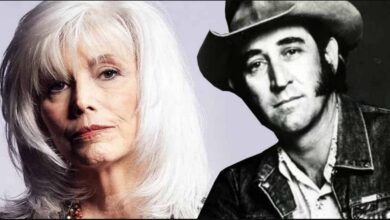Exhausted, He Performed Iconic Melodies One Final Time
Johnny Cash, often referred to as “The Man in Black,” was a unique figure in the landscape of American music. Born on February 26, 1932, in Kingsland, Arkansas, Cash’s early life was marked by the economic challenges of the Great Depression. His family’s struggles instilled in him a profound empathy for the downtrodden and a deep sense of justice, themes that would echo throughout his music. Cash’s interest in music began in his youth, influenced by gospel and folk traditions, which shaped his eventual style—a blend of country, rock, blues, and gospel that resonated with audiences across generations.
Cash’s rise to fame took flight in the 1950s when he signed with Sun Records. His debut single, “Cry! Cry! Cry!” established him as a rising star, quickly followed by hits like “Folsom Prison Blues” and “I Walk the Line.” These songs showcased his distinctive deep voice and storytelling prowess, often narrating the experiences of outlaws, the heartbroken, and those imprisoned by societal norms. His career was defined by an authenticity that struck a chord with listeners; he sang not just for entertainment but as a voice for the voiceless.
His personal life, however, was not without turmoil. Cash battled drug and alcohol addiction, a struggle that deeply affected both his career and relationships. It was during this tumultuous period that he met June Carter, a member of the legendary Carter Family. Their partnership blossomed into a love story that transcended mere romance; June became both his musical collaborator and a stabilizing force in his life. They performed together on numerous occasions, their chemistry palpable and their harmonies unmatched.
June’s influence was evident in hits like “Jackson,” which they recorded together and which became emblematic of their union. The song tells the story of a couple contemplating their life together and further cemented their legacy as a musical duo. The couple’s marriage on March 1, 1968, marked the beginning of a new chapter in Cash’s life, where he found both personal happiness and a renewed focus on his music. The duo’s performances infused their shows with a warmth and intimacy that captivated their audiences.
As they grew older, the Cashes faced the trials of aging, including health issues and the passing of loved ones. June Carter Cash’s death in May 2003 was a devastating blow to Johnny, who struggled to cope with the loss. Their partnership was not just a professional one but a deep emotional bond that supported them through their victories and struggles. Her absence was felt profoundly in his life and the music that followed.
Despite his declining health due to Shy–Drager syndrome, Cash’s devotion to his craft remained unwavering. His collaboration with producer Rick Rubin in his later years rejuvenated his career, resulting in critically acclaimed albums that reintroduced him to a new generation of listeners. This period of his life is marked by artistic exploration, where he covered a diverse range of songs, showcasing his versatility and ensuring that his music transcended traditional boundaries.
Cash’s last performance at the Carter Family Fold on July 5, 2003, occurs within this context of both artistic perseverance and personal grief. He sang songs that had defined his career while reflecting on the deep personal connection he had to the venue and the Carter legacy. Even with health issues and the weight of loss lingering over him, he continued to express his passion for music. The show, marred by struggles with laryngitis, highlighted Cash’s resilience and dedication to his audience.
The attendance of their son, John Carter Cash, emphasized the family’s strong musical lineage and support. John Carter has carved out his own identity in the music industry, contributing to both preservation and innovation in the genre. The act of Johnny performing with his son was a poignant reminder of the generational legacy that continued despite personal and familial challenges.
Cash’s passing on September 12, 2003, just months after June’s death, marked the closing of a significant chapter in music history. His impact extends well beyond his years, influencing countless artists and genres while embedding his spirit into the American cultural fabric. The narratives within his songs continue to resonate, capturing the essence of life’s struggles, love, loss, and redemption.
Johnny Cash’s life and music remind us of the power of storytelling. His legacy as a musician is not merely defined by chart success or accolades but rather by the authenticity of his voice. As we reflect on his legacy, we remember how he used music as a vehicle for personal expression and as a bridge connecting people from various backgrounds. When we hear his greeting, “Hello, I’m Johnny Cash,” we are invited to embark on a journey through the complex, rich tapestry of human experiences woven into each song. In this manner, he remains an enduring symbol of resilience, hope, and the transcendent power of music.





